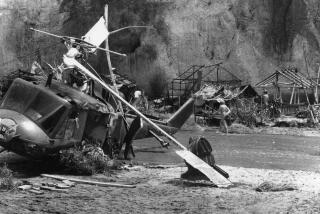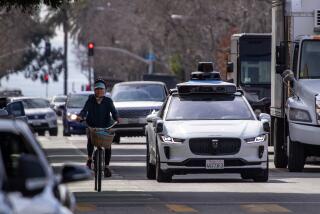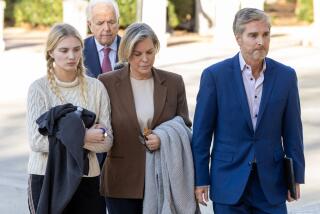Trial in ATV Crash Nearing Deliberations
- Share via
Was a 1982 accident that left a Spring Valley boy brain damaged and partially paralyzed caused by a fundamental design defect in the three-wheel all-terrain vehicle he was riding?
Or were young Frank Cusimano Jr.’s parents negligent in allowing their untrained, inexperienced son to climb aboard an off-road tricycle that is perfectly safe if operated properly?
Those are the two conflicting perspectives that jurors will have to weigh beginning today in a Superior Court case pitting Cusimano against the Honda Motor Co., manufacturer of the ATV the youth was riding as a passenger when the accident occurred.
Cusimano’s attorneys--echoing complaints being heard across the country--allege that the Honda ATC 110 is inherently unstable because of its three-wheel configuration and balloon tires. They charge that the product carried inadequate safety warnings, lacked a key that would control its use and should have been equipped with a protective foot guard to reduce the risk of injury.
Lawyers for Honda, meanwhile, maintain that the risks of the machines outweigh the benefits and note that thousands of families continue to enjoy the popular but controversial off-road vehicles without incident every day.
Attracted Wide Attention
The trial, which has spanned nearly six months, has attracted attention from personal-injury lawyers and consumer groups nationwide because it featured testimony from one of Honda’s top corporate officials. Honda’s attorneys resisted attempts to subpoena Tetsuo Chino, but the senior managing director of Honda Motor Co. ultimately was compelled to testify by the state Supreme Court.
In four days on the witness stand, Chino, who also is chairman of the board and former president of Gardena-based American Honda Motor Co. Inc., defended the company’s products and its record of responding to alleged deficiencies. Chino said he was unaware of an increase in injuries and deaths associated with use of the tricycles until 1984, when he ordered an inquiry into complaints.
The investigation, Chino testified, produced a report that concluded: “There is no problem with the machine. The problem is with the rider.”
ATVs have been plagued with controversy since they hit the market nearly 20 years ago. Priced between $600 and $2,000, the vehicles--also manufactured by Suzuki, Yamaha and Kawasaki--have been blamed for 20 deaths and 7,000 injuries a month over the past two years. About half of the victims of the estimated 880 deaths and 300,000 injuries since 1982 were under 16. Honda controls 55% of the ATV market.
Vehicle Sale Banned
Such statistics have sparked the interest of the U.S. Consumer Product Safety Commission. Last month, the commission confirmed an agreement with manufacturers banning the sale of three-wheeled vehicles.
The agreement, which Judge Ben Hamrick ordered attorneys not to mention during the Cusimano trial, also orders manufacturers to buy back all ATVs in dealer inventories, launch a nationwide safety training campaign, place warning labels on vehicles, raise the minimum operating age for most vehicles to 16 and mail letters to ATV owners alerting them of safety risks.
Chino’s testimony at the trial apparently marked the first time a high corporate official from Honda has taken the stand in a case centering on alleged defects in the company’s off-road cycles, according to attorneys affiliated with the ATV Litigation Group, an informal association of lawyers who handle cases involving the vehicles. Typically, engineers and members of Honda’s research and development division appear on behalf of the company.
In his closing remarks Wednesday, Honda attorney Richard Bowman attempted to paint the Cusimanos’ experience as a rarity when compared to the positive experiences enjoyed by thousands of enthusiastic ATV users. Bowman said owners of the estimated 2.5 million ATVs in use--more than half of which are tricycles--log half a billion riding hours a year, generally without injury.
Attorney Blames Parents
Rejecting claims by the Cusimanos’ attorneys that the three-wheeler is defective and responsible for the boy’s injuries, Bowman charged that Frank’s parents bear the blame for failing to exercise “the ordinary or reasonable care” that a typically prudent person would use to prevent injuries.
“How much help did you give him in understanding the dangers of this machine?” Bowman said, referring to Frank Cusimano Sr. “How much supervision did you give him? Did you delegate your responsibility to the neighbor? Did you take the position that you don’t understand things like this and you weren’t going to get involved?”
Occasionally straddling an ATV parked in the courtroom to make a point, Bowman also noted that the neighboring family whose son, Jason Kardos, was piloting the tricycle at the time of the accident continues to ride the vehicles and believes they are an enriching recreational pursuit.
When the Kardoses bought their first ATV, “they sat down with their boy, they quizzed him, they watched him, they got involved with it,” Bowman said. “The Kardoses . . . knew what they ought to do with this product, and guess what? They liked what they got. They think Honda delivered. And they bought two more.”
Bottom Line
The bottom line, Bowman said, is “this is not a case about the ATV, it’s a case about the operator. Because the vehicle can have whatever level of safety the operator wants.”
In his closing statement earlier in the week, the Cusimanos’ attorney, Craig McClellan, reiterated his attacks on the design of the ATC 110 and urged jurors to consider young Cusimano’s future as they contemplate liability and the awarding of damages.
The accident, which McClellan says occurred when Cusimano’s foot came off the vehicle’s foot peg and was trapped, causing him to be thrown from the tricycle, left the 15-year-old youth with a vocabulary of about 40 words.
McClellan said Cusimano, who was in the courtroom for about a month of the trial, had been “sentenced to eternal childhood” and likely would never enjoy marriage and the other pleasures of adulthood awaiting his peers.
“How do you value a sentence of eternal childhood?” McClellan asked the jury. The attorney recommended an award of $6.8 million in damages.
After Bowman concludes his closing remarks this morning, McClellan will be allowed rebuttal.






